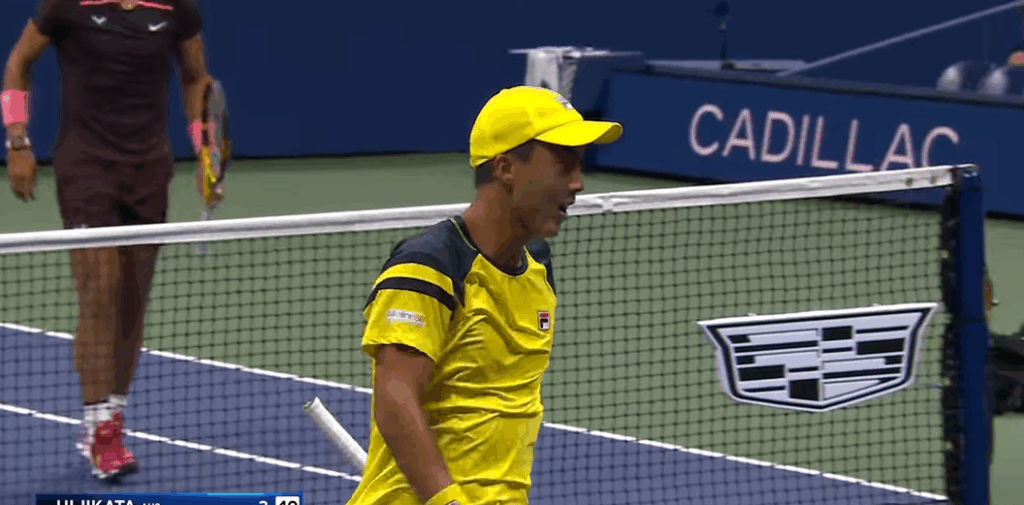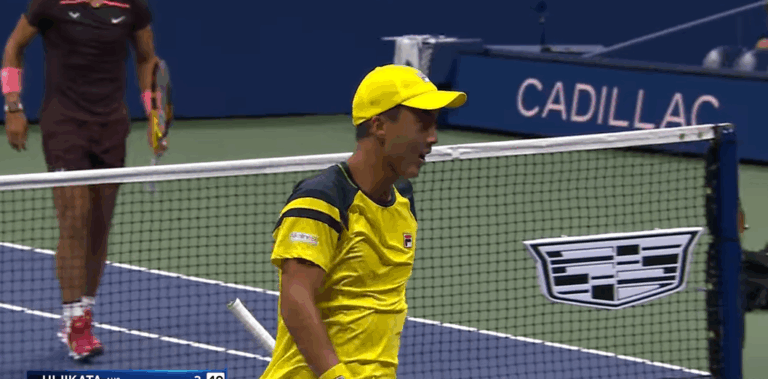Rinky Hijikata had a sharp serve, nimble footwork, and unwavering focus when he took the court at the US Open. However, beneath that calm exterior, his heart was bearing a burden that few onlookers could fathom. He had learned of a deadly shooting at the University of North Carolina, the same campus where he had previously studied and where his girlfriend, Lauren Baddour, still attends classes, just before he had won in the first round.
As Hijikata’s tennis career has significantly improved, Lauren, a composed and notably private college student, has quietly supported him. The two became friends while attending UNC and developed a relationship based on drive, self-control, and common goals. Her company at Wimbledon and the US Open has provided him with a sense of stability in the frequently hectic world of professional tennis. Rinky and Lauren have chosen privacy, preferring a deep connection to media attention, in contrast to celebrity couples who share every moment.
Hijikata battled with remarkable tenacity against Russian player Pavel Kotov for almost four hours. Each rally was interspersed with emotional fervor in addition to physical stamina. He later acknowledged to the media that what had transpired back in Chapel Hill had influenced his thoughts. He stated solemnly, “I was pretty happy with the win, but that’s kind of put a dampener on it.” It was very evident from his quiet yet heavy voice that he had been thinking about something far more significant than tennis.
Rinky Hijikata Profile
| Full Name | Rinky Hijikata |
|---|---|
| Born | February 23, 2001, Sydney, Australia |
| Age | 24 |
| Nationality | Australian |
| Ethnicity | Japanese-Australian |
| Height | 5 ft 10 in (178 cm) |
| College | University of North Carolina (2 years) |
| Girlfriend | Lauren Baddour |
| Ranking (Doubles) | Career-high No. 23 |
| Major Highlight | 2023 US Open Men’s Doubles Champion |
| Notable Earnings | $192,000 from 2023 US Open win |
| Source | Wikipedia |

The conversation about athletes’ emotional health has gained more attention in recent years. Athletes are not robots, as evidenced by Simone Biles’ withdrawal from the Olympics and Naomi Osaka’s remarks regarding mental health. Similar emotions were evoked by Hijikata’s experience, which was influenced by the horrific gun violence at his girlfriend’s school. He wasn’t denying the pain; rather, he was honoring it by competing. He pledged, “If anything, I want to try and play 10, 20 percent harder for everyone at school on Wednesday.”
Hijikata’s decision to choose resilience in the face of trauma offered a spirit that was remarkably similar to that of other tennis players, such as Andy Murray, who played through personal grief, or Juan Martín del Potro, who recovered from injuries that threatened his career. These tales are compelling not because of the accolades received but rather because of the incredibly human resilience displayed in the face of hardship.
This incident revealed something especially disturbing through well-timed media coverage: how commonplace college shootings have become in the United States. Hijikata revealed that he had frequently felt uneasy while studying in the United States. He was raised in Australia, where gun incidents are remarkably uncommon. He remarked, “There are moments when you don’t feel very safe.” His description of the incident as “not unexpected” exposed a widespread desensitization that is extremely concerning.
His emotional response reflected the feelings of innumerable international students, who are often torn between opportunity and insecurity, and went beyond a personal reckoning. College provides many young athletes with a springboard to success. For Hijikata, however, it became intertwined with a terrifying reminder of the perils of the real world.
Hijikata’s performance was remarkably effective in spite of the intense emotions. In addition to earning $192,000 from his first-round victory, he reached a personal milestone by moving on to face Marton Fucsovics for a chance at the third round. However, this match was not defined by advancement or money. His determination to play was unwavering, both for himself and for the people who were taking refuge in North Carolina out of fear.
His relationship with Lauren Baddour is especially unique because it fits in perfectly with his professional goals. Despite not being well-known, Lauren has provided the kind of support that doesn’t demand attention but instead appears subtly, regularly, and with great emotional fortitude. Their partnership exemplifies a common dynamic among professional athletes: the emotional weight of the person behind the scenes is equal to that of the player on the court.
Hijikata is a member of a new generation of tennis players who are changing the way that traditional narratives are told in the context of emerging talent. By choosing to play collegiate tennis, which is sometimes written off as a slower route, he has become emotionally and physically mature. Even though it is now tragic, his time at UNC laid the groundwork for this resiliency.
More athletes, such as Danielle Collins and Cam Norrie, have demonstrated in the last ten years that collegiate tennis can produce champions. With Lauren at his side, Hijikata adds a fascinating chapter to this increasingly prestigious path. When combined, they offer something very novel: a contemporary interpretation of collaboration in high-performance sports that is motivated by genuineness rather than performance aesthetics.
Hijikata has intensified his efforts since that fateful day. He acknowledged how emotionally startling it was to watch videos of students jumping out of windows. Still, he got to his feet. He participated. In the midst of chaos, he maintained composure and displayed professionalism well beyond his years.
Hijikata reminded fans that sometimes bravery is quiet by focusing on performing for his girlfriend and community. At times, it involves donning a headband, holding a racket, and entering a court while still crying. What it means to be young, talented, and emotionally sensitive in an uncertain time is reflected in his response, which was both intensely personal and remarkably universal.


